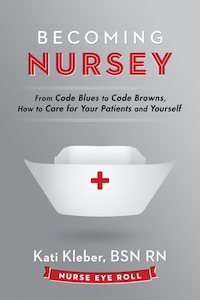 This is not a book for everyone to read and enjoy. I mean, you can still pick it up and peruse even if you aren’t, were, or are going to become a nurse because you’re a grown-ass adult who can make his or her own decisions and who the fuck am I to tell you what to do? You might not really get as much out of it as someone who does have some investment in the nursing field, though. This book goes from time management to advice when interviewing for your first nursing job to calling the attending physician (which you never have to do when you’re a student) to maintaining a work-life balance to funny and all-too-relatable stories about severely obese patients farting on you and the really hard shit like a first code.
This is not a book for everyone to read and enjoy. I mean, you can still pick it up and peruse even if you aren’t, were, or are going to become a nurse because you’re a grown-ass adult who can make his or her own decisions and who the fuck am I to tell you what to do? You might not really get as much out of it as someone who does have some investment in the nursing field, though. This book goes from time management to advice when interviewing for your first nursing job to calling the attending physician (which you never have to do when you’re a student) to maintaining a work-life balance to funny and all-too-relatable stories about severely obese patients farting on you and the really hard shit like a first code.
Becoming Nursey is the kind of book I wish someone would’ve given me any time from my second year in nursing school through to interviewing for my first clinical position. Nursing school doesn’t really train you how to be a nurse; it teaches you how to be safe to train to become a nurse. It’s a very exhausting, draining, exciting, tear-infused time, and you’re so focused on learning the basics and learning the book facts and stressing out about boards that you don’t always get the experience or the knowledge on how to actually be a person who is a nurse on an actual floor with actual patients. This book is meant to fill in the gaps in between and find the thread throughout all the chunks of information learned, and it does so in a more casual, often humorous tone that makes you feel like, hey, this shit is manageable, and I can do it!
Now, I’m in the OR, which is pretty specialized in nursing (we spent approximately 1 day in surgery out of my 24 months of schooling), and most of what is discussed in the book doesn’t really apply to me. Talking about checking lines and assessing patients regularly and morning reports mostly reminded me why I was so happy not to work in a unit because that shit is taxing and can be overwhelming. I spend most of my time interacting with surgeons, and my patients are sedated and almost completely covered in a drape. Anesthesia covers the medications and drips, and if they do their job right, the patient won’t even remember coming into the surgical suite after they wake, let alone meeting me. Still, I’m really glad I read this book. It was relatable and a nice reminder of all the stuff I worked so hard to becoming vaguely competent-ish at a just a few years ago. Kleber is clearly religious, but the book didn’t have a discernible lean in that direction, which I appreciated. She mostly struck me as the kind of preceptor or clinical instructor you’d want to have when you’re learning or new, someone who has enough experience to know what she’s doing but still close enough to being new she remembers what it’s like being green and scared and feeling constantly underprepared. Kati herself also seems like the nurse you’d want taking care of your mom—conscientious of the patient as a person as well as her rehabilitation and also very personable yet professional.
The book came from her blog, Nurse Eye Roll, which I think I’ll be checking out more often now. It’s a nice piece to have bound up to take wherever to read a relevant chapter whenever inspiration or clarity is needed. I’d definitely recommend it for anyone looking for a gift for a nursing student or someone just starting in the field.
Reviewed for Cannonball Read.
